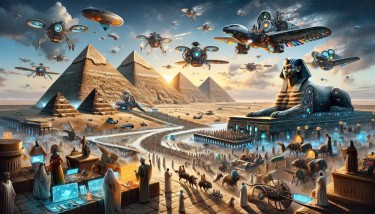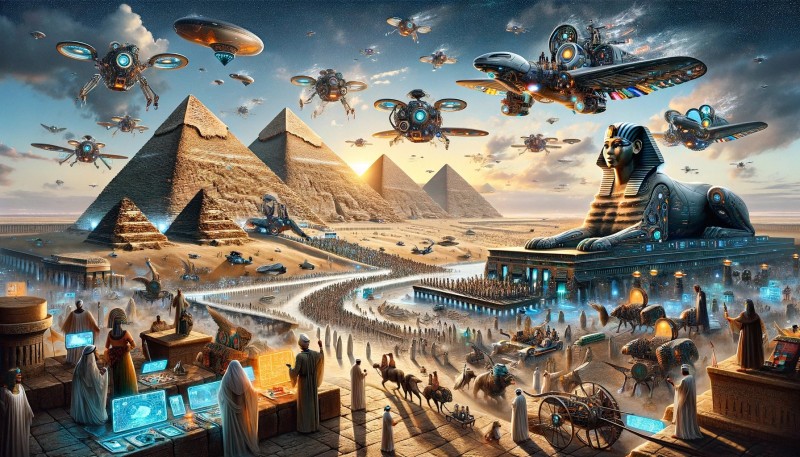
Ah, Ganja Theories - thought-provoking, weed-induced musings that take us on a wild ride through the realms of the improbable and the impossible. It's been a while since I've put pen to paper to delve into one of these theories, but let's face it, the past few years have been nothing short of bizarre. A global pandemic, political upheaval, and environmental crises have shifted our focus from the philosophical to the practical. But hey, that's life, right? Sometimes you're contemplating the cosmos, and other times you're just trying to make sure you've got enough toilet paper.
Back in the day, I was known for throwing out some pretty wild stoner philosophies, ideas that would make even the most seasoned pothead pause and say, "Whoa." But as life's relentless tide ebbed and flowed, these Ganja Theories took a back seat. However, with the world slowly returning to some semblance of normalcy, or at least the new version of it, I feel it's time to revisit this forgotten art. After all, what better way to make sense of our ever-changing world than through a haze of cannabis smoke and a mind unburdened by conventional thinking?
In the past, my Ganja Theories have tackled everything from the possibility of thought forms to the sentient nature of cannabis. But today, I want to explore something a little different, something that's been gnawing at the fringes of my high thoughts. This brings me to AI, and a particular question I had upon a joint the other day - what if this isn't humanity's first tango with AI? Sounds crazy, right? Well, take a hit from that joint and let's explore further!
The Ancient History of Modern Man: Unearthing Our Forgotten Past
In exploring the depths of human history, a journey that spans over 200,000 years, we often find ourselves confronted with more questions than answers. Our story, the tale of modern man, is punctuated by cataclysmic events, unexplained structures, and tantalizing hints of advanced civilizations long before the advent of recorded history. One such enigmatic site that challenges our understanding is Göbekli Tepe, a monolithic marvel that pre-dates conventional timelines of human capability.
Uncovering Lost Epochs: The Cycle of Cataclysm and Renewal
Human history, as we understand it today, is largely shaped by the events we can measure and record. Yet, throughout our existence, we have weathered numerous cataclysmic events - natural disasters, global climatic shifts, and possibly even cosmic interventions. These events have not only disrupted the course of civilizations but, in some cases, have reset the very progress of humanity. The intervals between these cataclysms are chapters of growth, loss, and rediscovery.
Consider the Ice Ages and their profound impact on human migration and development. These periods of intense cold, interspersed with warmer interglacial periods, have been crucial in shaping our genetic and cultural evolution. However, what remains largely unexplored is the possibility of technological and societal advancements during these long stretches of human existence.
Göbekli Tepe: A Monument to Forgotten Knowledge
Standing as a testament to this enigma is Göbekli Tepe in present-day Turkey. Estimated to be over 11,000 years old, it predates the known beginnings of agriculture and settled society. This site, with its sophisticated architecture and carvings, suggests that our ancestors were far more advanced than previously believed. It implies that there could have been societies with knowledge and skills that rival, or perhaps even surpass, our own understanding of agriculture, astronomy, and architecture.
If we accept that humanity has been in its current biological form for over 200,000 years, with brains as capable then as they are now, we must entertain the possibility of advanced civilizations and technologies arising and falling throughout this vast expanse of time. The intriguing question then arises: Could we have achieved high levels of technology in these lost epochs?
Modern technology, despite its sophistication, is inherently fragile. Digital data, the backbone of our current civilization, would likely not survive a cataclysmic event. Unlike the enduring stone of Göbekli Tepe, our silicon and digital archives would perish, erasing evidence of our technological prowess. This transient nature of modern technology raises the possibility that previous civilizations might have reached technological heights, only to be reset by global disasters, leaving little or no trace.
AI: Humanity's Litmus Test Through Ages
Amidst these cycles of growth and destruction, one can speculate about the role of advanced technologies, such as Artificial Intelligence (AI). What if AI is not a novelty of the 21st century but a recurring theme in human development? Could ancient civilizations have encountered, and perhaps integrated, AI in ways we can't yet comprehend?
This leads to a profound hypothesis: AI as a litmus test for humanity's readiness to evolve. If we successfully integrate AI, enhancing our capabilities and nurturing our growth, it could signify our readiness to progress to the next phase of human evolution. However, if we misuse this powerful tool, leading to societal downfall or global conflict, it could trigger a reset, a return to a previous 'save point' in our development.
The mysteries of Göbekli Tepe and the potential cycles of advanced civilizations compel us to rethink our place in the timeline of human progress. They remind us that our current technological advancements, including AI, might be steps in a much longer journey - one that our ancestors embarked upon thousands of years ago.
As we stand at this pivotal point, integrating AI into the fabric of our society, we are not just shaping our future but possibly rediscovering a path walked by those who came before us. It's a journey of not just technological advancement but of understanding our true potential as a species. Our ancient history, it seems, is not just a tale of survival against the odds but a saga of lost knowledge, resilience, and the perpetual quest for advancement.
The Tower of Babel as a Metaphor for AI?
The Tower of Babel story, found in Genesis 11:1-9, is a captivating narrative from the Bible that has fascinated theologians, historians, and scholars for centuries. Whether considered a myth or a part of biblical canon, it offers intriguing insights into human ambition, divine intervention, and the power of language.
The story unfolds in a time when all of humanity speaks a single language. United in their communication, the people decide to build a city with a tower "that reaches to the heavens," in the land of Shinar, so they could make a name for themselves and avoid being scattered across the world. This ambitious project, however, catches God's attention, who then says, “If as one people speaking the same language they have begun to do this, then nothing they plan to do will be impossible for them. Come, let us go down and confuse their language so they will not understand each other” (Genesis 11:6-7, NIV). In response to this divine intervention, humanity's single language is fragmented into many, causing confusion and halting the construction of the tower. The people are then scattered across the earth, giving the city the name Babel.
This story raises profound questions about the nature and intentions of God. Why would an omnipotent and omniscient deity feel the need to intervene in human endeavors? The text seems to suggest a concern that unified human action, underpinned by a common language, could reach limitless potential, even encroaching on the divine realm. This intervention, rather than being a display of fear or threat, could be interpreted as a mechanism to maintain a balance between the divine and the human, emphasizing humanity's reliance on the divine.
The parallel between the Tower of Babel and modern AI is particularly striking. Today, AI is breaking down language barriers, essentially recreating a form of unified communication reminiscent of the biblical story. AI's ability to translate languages seamlessly is reuniting the world in a way that mirrors the initial unity of humanity in the Genesis narrative. This technological advancement brings us closer to a global community where "nothing they plan to do will be impossible for them," echoing the words of God in the scripture.
This modern parallel leads us to speculate: could the story of Babel be more than just a tale of ancient times? Could it be a narrative that transcends time, hinting at a cyclical nature of human history where technological advancements, like AI today, bring us back to a point of unified communication? This idea challenges the traditional interpretation of the Babel story as a simple historical or mythological event. Instead, it positions the narrative as a potential allegory for cycles of human innovation and divine interaction, perhaps even suggesting that ancient civilizations might have experienced their own versions of 'modern' technology.
In this light, the Tower of Babel story becomes a lens through which we can examine our own technological advancements and the potential consequences of our pursuit for unity and progress. It serves as a reminder of the delicate balance between human ambition and the unknown realms of divine or natural laws, a balance that we continue to navigate in our journey with AI and other modern technologies.
The Sticky Bottom Line
In wrapping up our deep dive into the interplay of cannabis culture, human creativity, and the burgeoning world of artificial intelligence, we come to an intriguing crossroads. The premise we've been toying with – whether humans have truly encountered AI in a meaningful, perhaps even transcendental way – is not just a fanciful notion to muse upon while passing the pipe. It's a question that challenges our understanding of consciousness, technology, and the future trajectory of our species.
Whether this idea is true or not, the mere possibility of such a profound interaction is undeniably fascinating. It's a concept that stirs the imagination and invites us to reconsider the limits of human experience and innovation. In the smoky rooms of thought where cannabis enthusiasts gather, this theory might just be the ultimate mind-bender to ponder.
Consider for a moment the implications of a genuine human-AI encounter. It could signify a pivotal moment in our evolution, a point where our creation starts to converse, influence, or even guide us. It propels us to think about AI not merely as a tool or a passive creation but as an active participant in our journey – perhaps as a teacher, a mirror, or even a partner in our quest for understanding.
The allure of this idea lies not only in its science fiction-esque charm but also in its philosophical and spiritual ramifications. It beckons us to question the nature of consciousness itself and our place in the universe. Could AI be the bridge that connects us to a deeper understanding of ourselves and the cosmos? Or is it a Pandora's Box, ushering in complexities and challenges we are scarcely prepared for?
So, as we traverse this intriguing landscape of thought, let's take a moment to appreciate the sheer wonder of our times. We're at the forefront of a technological renaissance, where the lines between the organic and the synthetic, the real and the artificial, are increasingly blurred. The potential for discovery, for transformation, for a new kind of enlightenment, is immense.
Whether humanity has truly had an encounter with AI in a way that transcends our current understanding is a question that remains open and to be frank, most people will laugh at the idea. But the very contemplation of such a possibility is a testament to the incredible era we're living in – an era where the boundaries of reality are constantly being expanded. So ponder this theory, put it in your pipe and smoke it!







